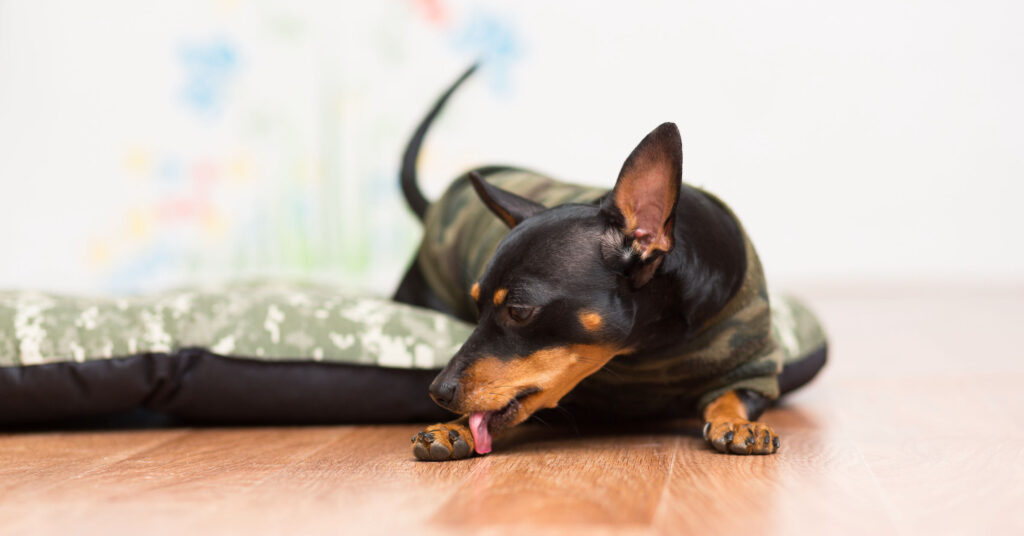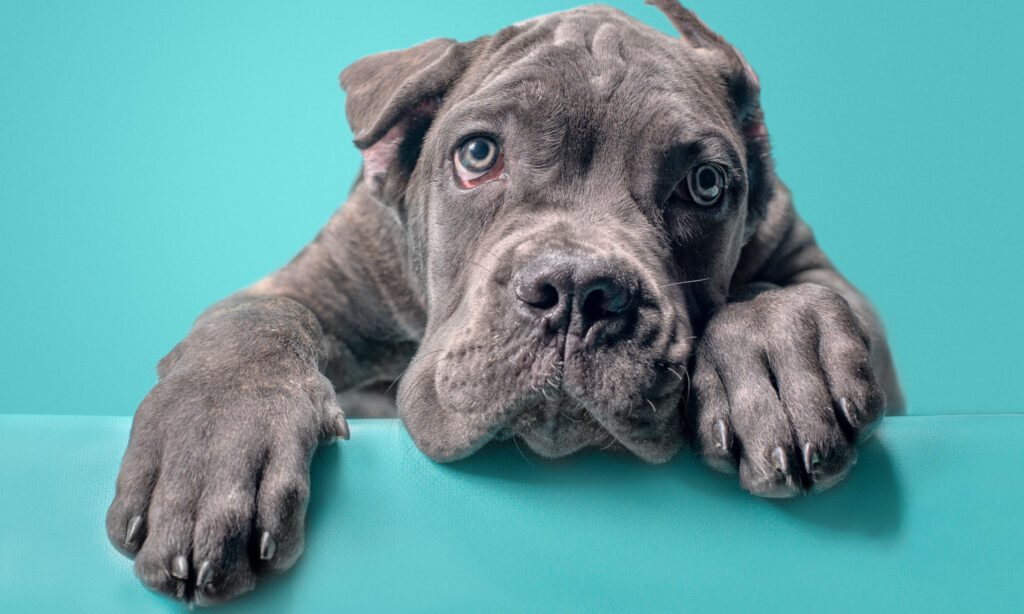Key Points
- Occasional paw licking can be your dog’s way of grooming themselves.
- Sometimes, paw licking is a sign of anxiety, stress, or pain.
- Skin allergies can lead to excessive paw licking.
Chances are you don’t go around licking your hands (except maybe after scarfing down Doritos), so it can be pretty baffling when your dog licks their paws. Can they possibly taste that good? Dogs lick their paws not because they taste like peanut butter, but for a variety of other reasons.
“Other than immediately after a wet walk, repetitive paw licking is always abnormal,” veterinarian Dr. Joanna Woodnutt tells us. “I’d always recommend that a pet owner take their dog to a vet if they notice repetitive licking. This way, the underlying cause can be found and treated. Getting to the root of the problem is the best way to stop your dog from excessive paw licking. Too much licking can cause skin damage and can become a habit.”
So, why do dogs lick their paws? And, when should you be concerned? Read on to find out.
1. Your dog is grooming themselves
Sometimes, dogs lick their paws to freshen up. If your pet is dirty from outside play, they may want to make themselves presentable and clean.
Paw licking can also be a sign that it’s time for a nail trim. Overgrown nails may be annoying for your dog, causing them to chew and lick their feet. If this is the case, you can cut their nails yourself or book an appointment with a professional groomer.
2. Your dog is injured
If your pup licks one specific paw repeatedly, check to see if they are trying to clean up an injury or if something is stuck between their paw pads.
“Dogs can lick their paw as an act of self-healing,” says Dr. Claudine Sievert, DVM. “Their saliva is rich in antibodies that can help heal the wounded areas.”
Paw injuries often stem from your dog accidentally stepping on something sharp — a nail, glass, insects, rock salt, and more. Walking on hot asphalt can also cause paw pain, blisters, or other injuries.
Pet Pro Tip: Illnesses won’t wait to happen. You shouldn’t wait to enroll in pet insurance. From common parasite infections, to costly hereditary illnesses, pet insurance is worth it and can cover crucial eligible treatment your pet may need for their unexpected accidents and illnesses. Find out how pet insurance works, what pet insurance covers, and choose a plan today.
Think your dog has an injury? “The first thing you should do is inspect the paw carefully and then take the dog to the vet,” Dr. Sievert says. “The vet will trim down the hair to look for an insect bite or the signs of any injury. Then if they find the issue, the vet will disinfect the area and maybe apply some local antibiotics.
3. Your dog is anxious

Dogs have feelings, too, and licking can be a way to soothe anxiety or cure boredom. Your dog might lick you for the same reason. The behavior can also become an anxious habit if your dog has a compulsive disorder.
“Some dogs may do it because they feel stressed and self-grooming is proven to reduce stress in all mammals,” Dr. Sievert points out.
Common triggers for this behavior include:
- The introduction of a new family member
- Separation anxiety
- Moving to a new house
- Bringing your dog home for the first time.
Compulsive behaviors may require an extensive diagnostic workup by your veterinarian. This can rule out underlying medical problems.
For pet owners worried about the cost of future vet bills, a Pumpkin pet insurance plan can help you save money on eligible expenses related to unexpected accidents and illnesses.
4. Your dog is itchy
Constant licking can be a sign your pet’s paws are itchy. “If there is no wound on your dog’s paw, the vet usually suspects itchiness is allergies,” says Dr. Sievert.
“It can be a reaction to the surface they are walking on. Some dogs can have a problem with certain plants, or even with some chemical that the owners use when washing the floors. On the other hand, some dog breeds experience food allergies that also can manifest as itchy skin and licking of the paws (including French bulldogs and West Highland terriers).”
Itchy paws are often caused by dermatitis and skin allergies. Some allergies are caused by grass or pollen, while others can be caused by food. You’ll want to check with your veterinarian to determine the cause of your dog’s environmental allergies.
“If there is no visible injury, the vet may suggest a diet change to rule out any food allergy,” Dr. Sievert advised. “If the vet suspects the seasonal grass allergy, he may prescribe some antihistamines or steroids to reduce the inflammation.”
Bacterial infections can also make your pooch’s paws itchy. Your veterinarian can identify and treat any underlying conditions with medication.
5. Your dog has arthritis
If your dog doesn’t have any visible injuries and no detected allergies, paw licking can be a sign they have arthritis in their paws. You may also notice they lick their joints, have pain when touched, or have difficulty walking.
Schedule a check-up with your veterinarian to determine a diagnosis and treatment plan to soothe your dog’s paw licking and joint pain.
6. Your dog has parasites
Fleas, ticks, and mites can irritate your dog’s paws. Bites are itchy, and your dog may try to soothe themselves by licking.
You can check your dog’s fur and feet to see if you spot any fleas or ticks. Look behind their ears, their legs, and their tails. Even if you don’t find any critters, there may be other signs such as skin irritation or hair loss.
There are a range of treatments available, including oral and topical parasiticides. Check with your vet to get the right solution for your dog.

Is it dangerous for dogs to lick their paws?
When should you be concerned if your dog licks their paws? Excessive paw licking isn’t normal behavior and can lead to skin irritation, hair loss, discharge, and yeast infections.
Dr. Leslie Brooks, DVM, notes, “If a dog is licking their paw so much that it is causing the paw to get red and inflamed, lose fur, bleed, or get infected, the owner should take the dog in to their vet to find out what could be the underlying cause, so that they can get a treatment plan going.”
What should I do if my dog keeps licking their paws?
If licking becomes a habit, inspect your dog’s paws. If they don’t let you, chances are they’re in pain.
“Sometimes, an Elizabethan collar (also known as the cone of shame) can be put on the dog to prevent them from licking,” Dr. Brooks said. She added, “You can put bitter apple or bitter orange spray on the paw because it will taste bad to the dog to deter them from licking.”
What about bandages? “Unless a veterinarian applies a bandage, I do not advise owners to put bandages on their dog’s paws because I have seen too many cases where a bandage is either applied too tightly or incorrectly and it cuts off circulation to the paw, causing the skin to slough and even requiring an amputation in some cases,” Dr. Brooks said. “Also, the bandage will sometimes cause dogs to lick more, and then they are at risk of hurting themselves more by trying aggressively to get the bandage off and even swallowing the bandage material, leading to an intestinal obstruction.”
Dr. Woodnutt recommends socks or boots to deter licking, but advises, “Take care they don’t eat them and make sure they’re changed regularly.”
Understanding why your dog is licking their paws
If your dog is licking their paws, they may be trying to clean themselves. But constant paw licking likely points to an underlying issue.
If your dog is anxious, has a flea infestation, or irritated skin, paw licking can help them feel better. Alternatively, they may have an injury or something stuck in their foot. If you’re worried about frequent licking, the best person to chat with is your vet.




